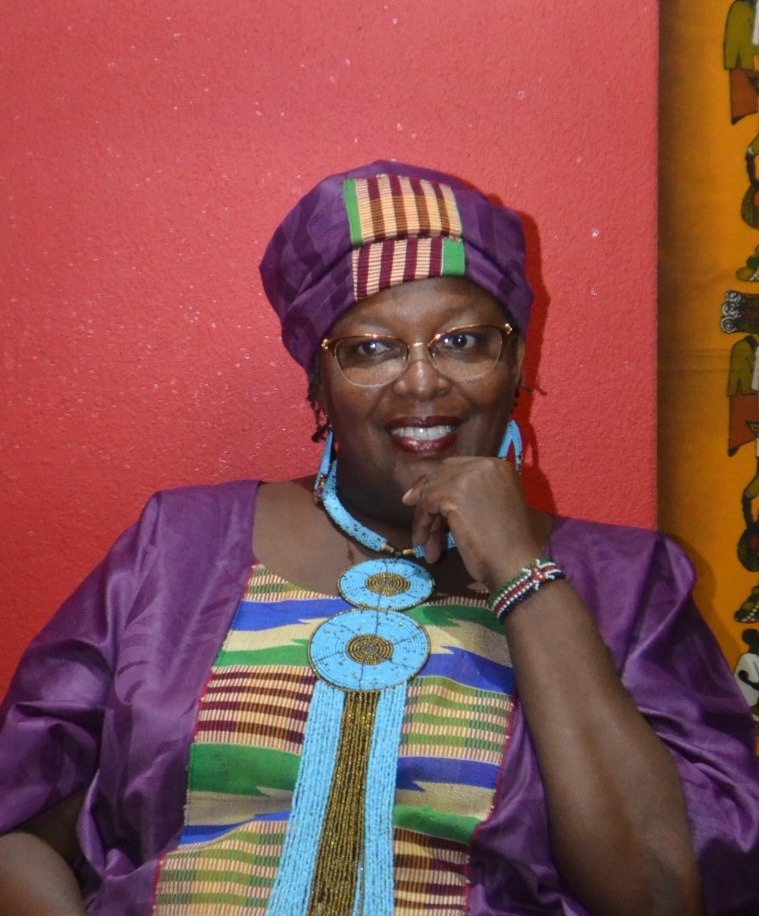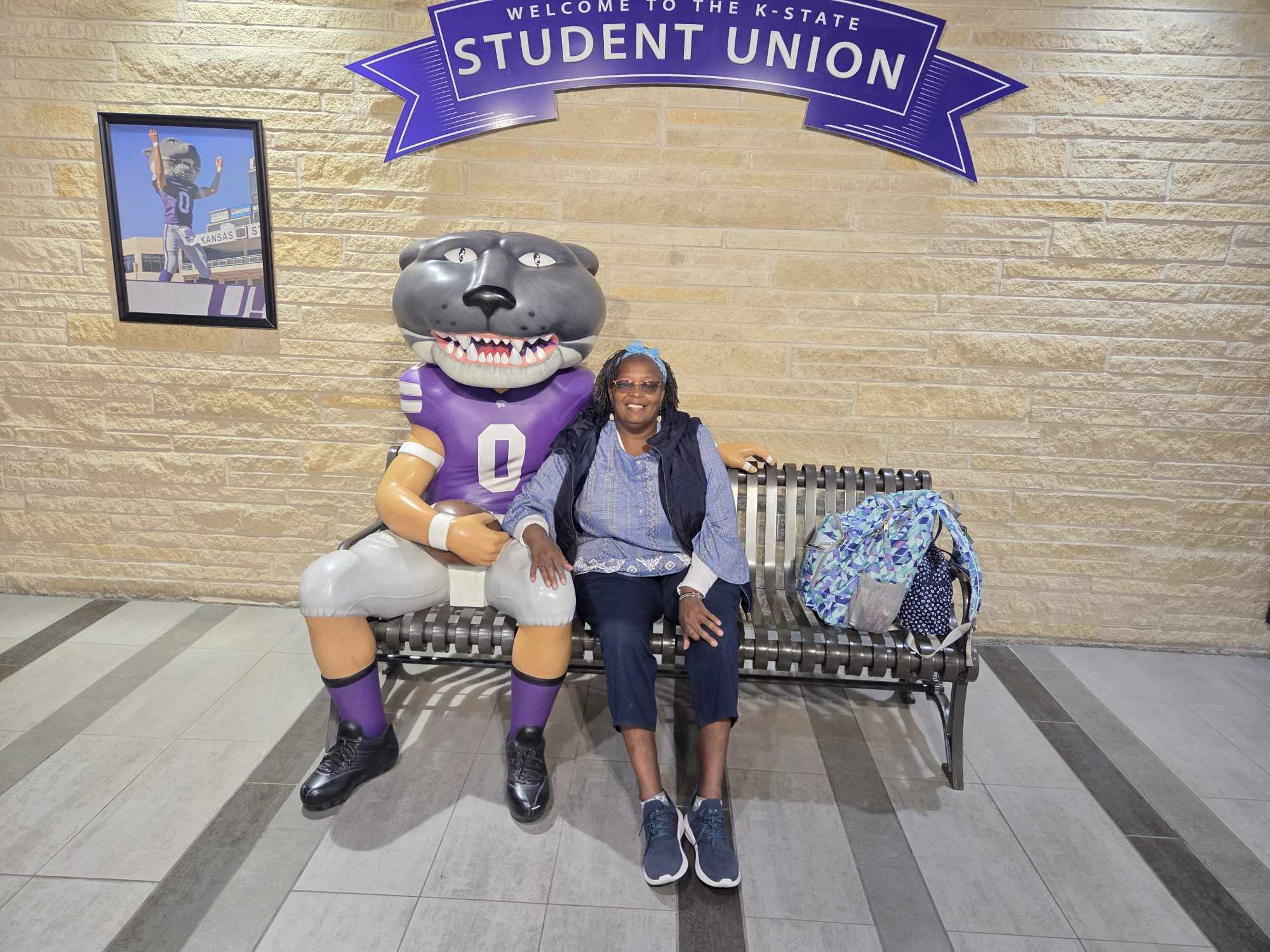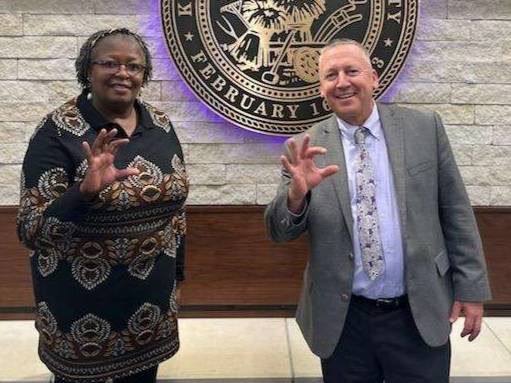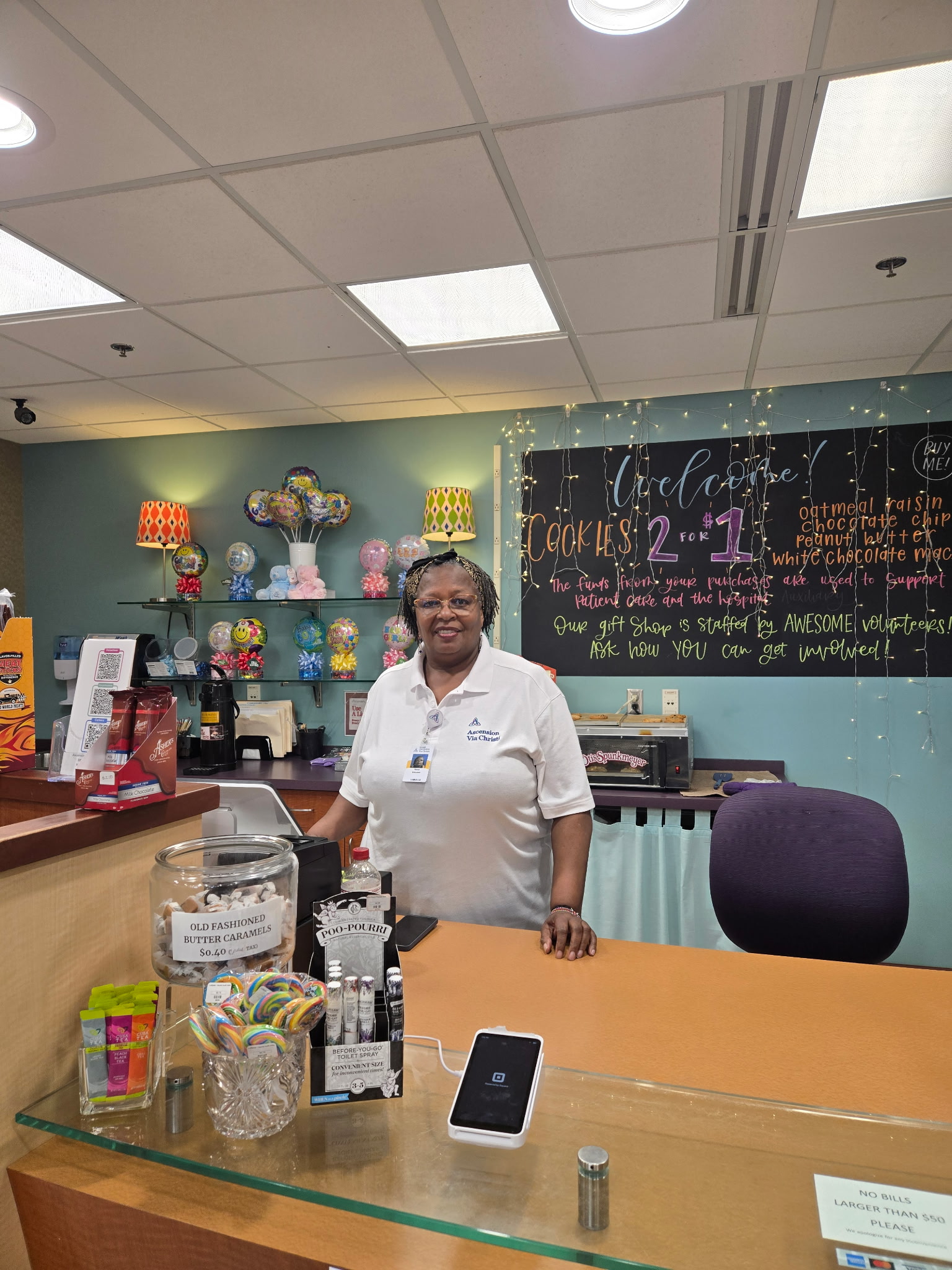Dr. Wanja Njuguna: The A.Q. Miller School's First Fulbright Scholar Brings a Global Perspective to K-State
May 7, 2025

For the first time in its history, the A.Q. Miller School of Media & Communication hosts a Fulbright Scholar — an honor highlighting the school’s growing role in international academic collaboration.
Wanja Njuguna, an accomplished journalist, researcher and media scholar, joined Kansas State University from Namibia as a Fulbright Scholar, bringing extensive knowledge in public health communication, journalism studies and global media.
“The A.Q. Miller School is proud to host Dr. Njuguna as our first ever Fulbright Scholar,” said Heather Woods, director of the school. “Her research in health communication is incredibly valuable, and this opportunity aligns with our school’s commitment to collaborative research and global partnerships.”
Njuguna, who has a doctorate in media studies, brings a distinguished career spanning more than 25 years, including roles as a journalist, academic and advocate for public health and human rights. Her journey to K-State reflects her passion for ethical journalism and cross-cultural knowledge exchange. As a faculty member at Namibia University of Science and Technology (NUST), she sees her Fulbright experience as an important connection between African and American journalism education.
“Fulbright is more than just an academic exchange,” Njuguna said. “It is about sharing knowledge, learning from each other, and building long-term global partnerships that will continue well beyond my time at K-State.” Regarding these partnerships, she has had meetings with the Office of International Partnerships, the College of Agriculture, K-State Alumni Association and counterparts at NUST which she feels would benefit from each other’s specialties.
Before entering academia, Njuguna had a distinguished journalism career, covering diverse topics ranging from human rights and global health to political affairs and investigative stories. She spent eight years working with Nation Media Group, the largest media organization in Kenya, and was recognized as the Co-Overall winner of the CNN African Journalist of the Year Award in 2000 against over 1100 entrants. Her story entitled “Union Made in Hell” reviewed domestic violence among women leaders in Kenya. This prestigious honor created opportunities for her to participate in a French government trip to projects dealing with domestic violence in Paris and international fellowships at Stanford and Harvard, where she also did a second master's degree in public administration.
Throughout her journalism career, she consistently emphasized the importance of responsible and ethical reporting, especially in public health communication. She observed firsthand how media shapes public perception, particularly in coverage of HIV/AIDS and other infectious diseases.
“The way we talk about public health matters,” Njuguna emphasized. “Language can either inform and empower, or it can reinforce stigma. Journalists have a responsibility to tell stories accurately, sensitively and to be especially careful what words or terminologies they use, especially when it comes to health crises.”
Njuguna’s Fulbright journey to K-State was shaped by a longstanding professional relationship with Nancy Muturi, a professor at K-State. The two first connected at an IAMCR conference in Hyderabad, India, in 2014. Their shared research interests in health communication, PR campaigns and ethics fostered ongoing discussions, making K-State the perfect academic home when Njuguna received her Fulbright award in 2024.
“I’d always been very keen to work with Dr. Muturi in the areas of HIV and other communicable diseases as well as health communication in general,” she explained. “When I got the Fulbright, I wrote back and said, ‘I have a Fulbright, can I come?’ I had a mentor; someone I was familiar with. And then, of course, I looked at the program and saw how K-State combined journalism and communication. For me, it worked very well. So that was one of the things that brought me to Kansas.”
One significant initiative she is working on alongside Muturi involves using the Risk Information Seeking and Processing (RISP) Model to examine how individuals process health-related information. This research explores why some people take immediate action after receiving health warnings, while others ignore or dismiss the message.
“Understanding how people deal with health information especially as portrayed in the media is critical,” she explained. “People respond differently: some take immediate action, others ignore it entirely. Understanding these behaviors is critical to improving public health communication strategies.”
Njuguna’s research addresses the impact journalists can have on consumers’ response to public health crises. She has observed how misinformation, stigma and unethical reporting can shape public perception and health outcomes.
“Words matter,” she stated. “The way journalists frame stories about diseases like HIV/AIDS, tuberculosis, Ebola, and COVID-19 can either empower or further marginalize those affected. Responsible reporting is crucial in public health communication.”
Additionally, Njuguna is developing a journalism toolkit for media professionals within the Southern African Development Community (SADC), providing guidelines on sensitive and ethical reporting. The project aims to ensure that stories about communicable diseases prevalent in the region are reported with accuracy, responsibility and respect.

As an educator, mentorship is central to Njuguna’s work. She is passionate about helping students understand journalism and public health communication as global disciplines, urging them to think beyond local contexts and embrace international opportunities. “One of the most fulfilling parts of my time at K-State has been engaging with students and helping them see journalism as a global field,” she said. “The stories we tell don’t just affect our immediate communities; they contribute to international conversations.”
She encourages students to expand their perspectives and explore international opportunities for cultural and intellectual growth, whether through Fulbright programs, study-abroad experiences or global research collaborations. “There’s great value in stepping outside what’s familiar and engaging with the world at large,” she said.
Since her arrival, Dr. Njuguna has actively engaged with students, collaborated on a research project, and built new academic partnerships. One memorable experience was meeting K-State's President Richard Linton, whose openness and accessibility impressed her deeply.

“I was amazed by how accessible the university leadership is,” she said. “When I introduced myself to President Linton during the Inaugural University Outstanding Scholar award ceremony in October last year, he immediately gave me his assistant’s email and told me to schedule a meeting. We were supposed to meet for 30 minutes; I think we spoke for more than an hour. We didn’t just chat about me; we talked about academia, leadership and global collaboration.”
For the rest of her time at K-State, Njuguna remains committed to fostering lasting academic partnerships between K-State and her home university in Namibia. “The connections we make through programs like Fulbright don’t just end when we leave,” Njuguna said. “They open doors for future scholars, researchers and students to continue building meaningful global partnerships.”

In addition to her academic work, Njuguna finds time to engage in voluntary work at a local hospital, a homeless shelter and earn a CASA certification to be a child advocate. She has also made use of the Innovation Lab at the Library to learn more about podcasting, revive her sewing skills and practice Spanish.
As she continues her work at K-State, Dr. Njuguna is leaving a legacy of strengthening the university’s commitment to global engagement and preparing the next generation of journalists and media professionals for an interconnected world.
Explore writing, research and public scholarship by Dr. Njuguna
Recent Research Paper:
Njuguna, W., & Akpabio, E. (2024). HIV & AIDS Stigma and the Media in Namibia. Mass Communicator: International Journal of Communication Studies. 18 (2), 4-10, DOI No: 10.5958/0973-967X.2024.00009.6
Book Chapter:
Njuguna, W., & Kauaperura, U. (2016). “The Media Impacts the Image of the Youth.” In Friedrich Ebert Stiftung10 Year Commemoration Book. FES: Windhoek
Recent Media Interviews
- Late release of political part manifestos risks voter confusion, Future Media News
- Marginalized Communities Reporting Toolkit, NBC | April 2024 | Watch interview
- UNESCO Awards Training Grant to NUST: Marginalized Groups Undercovered by the Media, NBC | November 2023 | Watch interview
Newspaper Articles:
- In Erwin Bach, love had everything to do with Tina Turner... lessons in love, domestic violence, resilience New Era
- Media: Where Are the Women? New Era via PressReader
- Tribute to Global AIDS Activist Larry Kramer New Era
- Journalists’ Lives Matter, Too... The Namibian